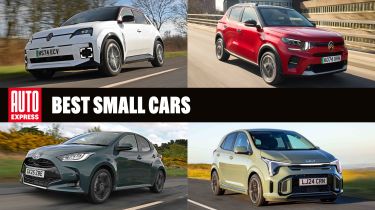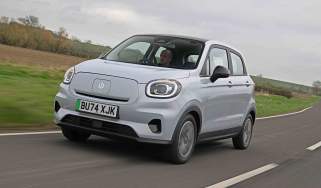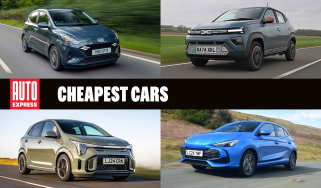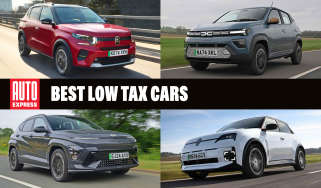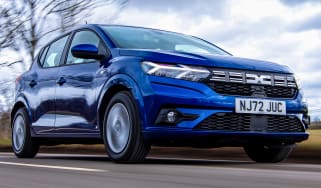Best small cars to buy 2026
Small cars come in all shapes, if not sizes. Here we highlight the best ones to buy
The best small cars on sale today combine a truly grown-up blend of driving composure, practicality and advanced in-car technology. On top of all that, the best small cars need to be generally affordable to buy, economical to run, and reasonably cheap to insure.
One of the main advantages of a small car is the inherent efficiency you get with a more compact, lighter car.
We’ve tested every small car in the UK to compile our top 10 models in the UK to buy now. Our list includes a variety of small car body shapes ensuring there's a small car to suit everyone and expert buying advice to help you pinpoint the right model for your needs.
Top 10 Best Small Cars
1. Fiat Grande Panda
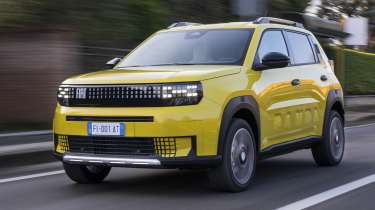
- Prices from £18,000
- Auto Express Small Car of the Year
| Pros |
|
| Cons |
|
It’s quite a bit bigger than its predecessor, but the Fiat Grande Panda is still the best small car you can buy.
Available with either a hybrid or electric powertrain, it is very cheap to run regardless of which variant you go for. The EV can return up 199 miles on the WLTP combined cycle, while the hybrid can achieve an average of 52.3mpg. Neither variant is alarmingly expensive, either, with the hybrid starting from £19,000 and the electric car only £21,000.
The 412-litre boot is one of the more generous in the small car class, and there’s a decent amount of room for all passengers, provided the tallest ones avoid the rear seats.
We’re particularly big fans of the innovative coiled charging cable, which saves the nuisance of having to wrestle with a bag every time you want to top up the battery.
The interior is pleasant, with bright colours and an easy-to-read twin-screen dashboard. We also love the Easter egg that is the oval shape of the dash – inspired by the Lingotto test track that sits on the roof of Fiat’s old factory in Turin.
While it’s not quite as fancy as a Renault 5, Fiat has done an admirable job with the Grande Panda’s interior. Some pleasing dashes of bright colour help to create a pleasant overall atmosphere. The twin-screen dashboard is bright and easy to read, too.
“Building a desirable, affordable car is tough in 2025, but Fiat has played a blinder by delivering a new Grande Panda that’s not just cheap, but packed full of character and, should you wish, comes with an electric powertrain.” - Jordan Katsianis, senior staff writer.
Fiat Grande Panda reviewLatest Fiat Grande Panda deals
2. Kia Picanto
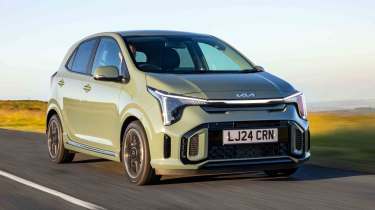
- Prices from £16,700
- Best value for money
| Pros |
|
| Cons |
|
The Kia Picanto offers lots of kit and a driving experience for a small car and is more akin to that of a car from the class above.
A mid-life facelift gave it more efficient engines and improved on-board tech, while Kia’s excellent seven-year warranty remains – not bad for a car with a sub-£17k starting price. The Picanto is also very cheap to insure.
Practicality is good for a car of this size too; all come with five doors and there’s enough space in the back for two adults to sit in relative comfort. The boot measures in at 255 litres, which is considerably more than the 200 litres offered by the more premium-feeling MINI Cooper.
Every version of the Picanto also comes with a decent helping of big-car kit including an 8.0-inch infotainment screen with Android Auto and Apple CarPlay connectivity, cruise control and a reversing camera.
To drive, the Picanto’s sub-one-tonne kerbweight really does help aid agility, although overall the chassis isn’t that communicative or sporty.
“Whichever way you look at it, the Kia Picanto is one of the most affordable cars money can buy. That goes for everything from list price, fuel, and other consumables.” – Ellis Hyde, news reporter.
Kia Picanto reviewLatest Kia Picanto deals
3. Renault 5
- Price from £21,495
- Best for efficiency
| Pros |
|
| Cons |
|
After plenty of anticipation, the fully-electric Renault 5 has arrived, and the good news is that this is a capable small car that’s worthy of its famous name.
Beyond its retro design, the electric Renault 5 offers a respectable range of up to 249 miles, and plus a punchy 148bhp motor. Meanwhile, the lower-end model has a 193-mile range from its smaller battery, and 118bhp. All 5s are eligible for the government electric-car grant so prices start at under £22,000.
The Renault 5 drives with the same maturity as its combustion-engined Renault Clio sibling, and has a firm yet well-damped ride. The brake pedal provides more confidence than most EVs’, although the throttle can feel a little vague. If you want similar levels of style but even more performance (albeit less range), then the sporty Alpine A290 could be the ideal solution.
Some materials are on the cheaper side, but even the base model includes a good amount of standard equipment, such as 18-inch alloy wheels, a 10.1-inch touchscreen, and cruise control. The cabin design is both simple and attractive, and while rear space is a bit tight, the 326-litre boot is decently large for a car that’s less than four metres long.
“While the Renault 5 plays heavily on nostalgia, there’s so much joy in this little package that it’s impossible not to be impressed. It feels like a more compelling posh supermini than a MINI Cooper or Peugeot E-208.” – Alex Ingram, chief reviewer.
Renault 5 reviewLatest Renault 5 deals
4. Citroen e-C3
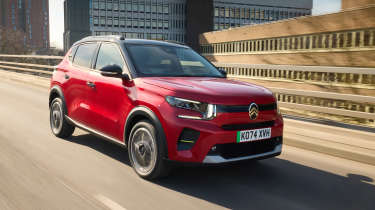
- Prices from £20,500
- Previous Auto Express Car of the Year winner
| Pros |
|
| Cons |
|
The Citroen e-C3 is a good example of a small car which is able to offer all the essentials you need at a very affordable price.
A claimed 199 mile range (although this will be a little less in real-world driving) won’t write any headlines, but for a shade over £20,000 it’s not bad at all, undercutting a similar-range Renault 5 by around a grand and the basic Hyundai Inster by about £2,500.
Performance is exactly where it needs to be for an urban runaround. Around town the e-C3 is nippy, while it can easily handle motorway journeys with its 84mph top speed. If a range of 199 miles seems a little low to you, then there’s always the conventional 1.2-litre petrol Citroen C3 which starts at just under £19,000.
The ride and handling are well judged, and the cabin is comfortable, spacious, and well-packaged, with a distinctive design and a basic but perfectly usable infotainment system.
“Citroen has produced a supermini with class-leading comfort and plenty of space, all while creating a car that doesn’t feel like it’s unduly compromised by its low price point. The e-C3 really is a benchmark for the rest to aim for.” – Alex Ingram, chief reviewer.
Citroen e-C3 review Latest Citroen e-C3 deals
5. Hyundai i10
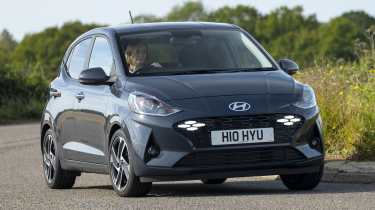
- Prices from £17,100
| Pros |
|
| Cons |
|
The Hyundai i10 is a very strong contender in the small car class thanks to its clever packaging and strong refinement. The i10 is such a good car that we named the i10 our City Car of the Year at both the 2023 and 2024 Auto Express New Car Awards.
The i10 is offered with a choice of petrol engines in the form of a 66bhp 1.0-litre unit which can feel sluggish on motorways, and an 83bhp 1.2-litre which is almost £500 more expensive. For the most part, both engines impressed when we drove the car. All variants of the i10 are frugal, but we’d opt for the manual gearbox as the automatic isn’t the smoothest during shifts but on the road.
The i10’s cabin is capable of seating four adults (or has two sets of Isofix points in the rear for child seats). Build quality is perfectly acceptable for the class and all cars come with air-conditioning, cruise control and an eight-inch touchscreen display with Apple CarPlay and Android Auto.
“The Hyundai i10 isn’t going to set any land speed records, but what’s more important to city car buyers or perhaps those on a tighter budget is its ability to deliver great efficiency, leading to low running costs.” – Ellis Hyde, news reporter.
Hyundai i10 reviewLatest Hyundai i10 deal
6. Leapmotor T03
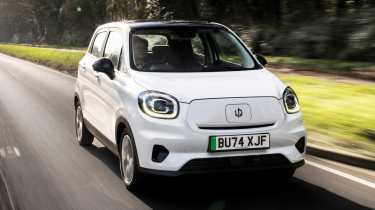
- Prices from £16,000
| Pros |
|
| Cons |
|
If you’re someone who resents how big and complicated modern cars have become, the Leapmotor T03 should be a welcome sight.
The Leapmotor T03 is a car that’s hard not to root for. It’s small, cheap, and yet full of equipment. Unfortunately, the T03 sits in insurance group 25, which is disappointingly high compared to small car rivals. Apart from that, though, it should prove very easy on the bank account.
While the claimed 165-mile range isn’t a mammoth one, this is still plenty for darting around the city streets. We think it’s here where the little Leapmotor is at its best, too, thanks to excellent all-round visibility and very light controls.
In order to keep the costs in check, the T03’s interior is a simple one, but it’d be unfair to call it sparse as there’s a surprisingly generous amount of kit and storage space throughout. It all feels nicely put together, too, even if the materials are a bit on the economical side.
While it’s pretty tiny on the outside, there’s a decent amount of space inside the T03. Four adults can get seated, although they’ll be quite close together. The similarly-priced and sized Dacia Spring has a larger boot, though, at 308 litres compared to the Leapmotor’s 210.
“This might seem like a back-handed compliment, but the most important thing you can say about the way the Leapmotor T03 drives is that it feels like a normal car. From the outside, you might have a preconceived notion that it will flop around on its comically thin tyres and have all the balance of a mid-game Jenga tower, but overall, it is decent enough to drive.” - Richard Ingram, deputy editor.
7. MG3
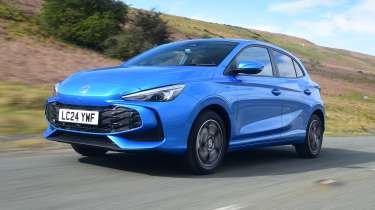
- Prices from £17,300
| Pros |
|
| Cons |
|
The MG3 has quickly become one of our favourite small cars, largely on account of its strong performance and excellent value for money.
You can spec the MG3 with a hybrid powertrain which makes a punchy 192bhp from its 1.5-litre engine and electric motor combination. Out on the road the hybrid MG3 outsprints most rivals you’d care to mention, all while achieving an economy of over 64mpg.
The hybrid variant costs an additional £2,000, but this saving is offset a little by high insurance groups of 23-24, though this perhaps isn’t surprising given the power output.
On the road the MG3 is sometimes a little sudden in switching between petrol and electric power but most of the time it’s smooth with more than sufficient performance. Likewise, Lotus won’t be taking notes on the MG3’s chassis, but it’s grippy and even quite fun if you’re in the mood, while the ride quality handles craggy roads pretty well, too.
Inside, the cabin is smartly styled and there’re plenty of useful storage spaces dotted around. The boot is reasonably-sized at 293-litres. Getting comfy behind the wheel can be an issue for taller drivers, as we discovered on our tests, because you can’t adjust the reach of the steering wheel.
“The hybrid system delivers a level of performance that blows its rivals away, yet despite this, it’s relaxing to drive and almost as frugal as those much slower alternatives.” – Alex Ingram, chief reviewer.
8. Toyota Yaris
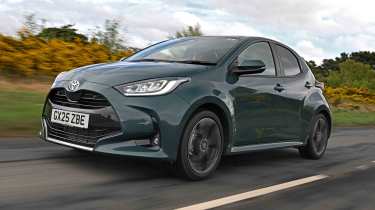
- Prices from £22,500
| Pros |
|
| Cons |
|
You’ll have to pay more up front to put a Toyota Yaris on your drive, compared with the other petrol models on this list, with pricing starting at over £22,000.
But the upside is that, with an astounding average fuel economy of nearly 70mpg (a figure that isn’t out of the question in real-world driving either), you will definitely save money at the pumps. Throw in reasonable car insurance costs and solid residual values, and the Yaris proves itself as a credible performer in the long term.
It’s not like the Yaris is a sluggard, with 114bhp and 128bhp models that both get from 0-62mph in under ten seconds. With an e-CVT gearbox there’s occasionally some noise under hard acceleration, though the Yaris uses a three-cylinder engine these days so it’s less thrashy than before, and in most running it’s nearly silent.
The base Icon model is well equipped, so there’s no need to bump up the asking price any further, while reassuring levels of standard safety kit and Toyota’s class-leading warranty cover of up to 10 years are hard to beat.
It’s a little tight on space compared to some supermini rivals and the 286-litre boot lags behind several rivals, but it’s better up front, and feels built to last, too. Overall the Yaris is a competent and efficient small car all-rounder.
“The fourth-generation Yaris is a great performer in the urban environment, and it can cope with a bit of B-road and motorway action on the odd occasion. However, it isn’t the cheapest hybrid around.” – Max Adams, online reviews editor.
Toyota Yaris reviewLatest Toyota Yaris deals
9. Renault Clio
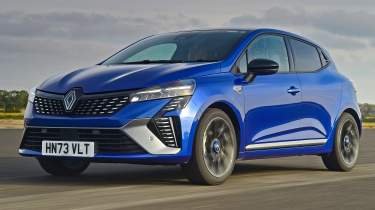
- Prices from £19,000
- Best for big car feel
| Pros |
|
| Cons |
|
The Renault Clio had an unbroken run between 2020 and 2022 as our Small Car of the Year and there’s a very good reason for this. With a fantastic blend of style, practicality and refinement, the Clio is a hard car to beat, and a mid-life facelift back in 2023 has kept the striking five-door hatchback close to the top of the class.
The Clio range encompasses petrol and hybrid versions, and all drivetrains have a polished feel; it’s a small car that drives like a much bigger one (without actually feeling large and unwieldy).
The hybrid’s fuel economy stretches into the mid-60mpg range and it’s frugal in the real world too, while the 89bhp petrol is one of increasingly few cars that offer a manual gearbox.
You’ll find the Clio’s roomy interior offers plenty of family-friendly flexibility with its comparatively huge 391-litre boot, even eclipsing those of many models from the class above.
The interior is attractive too and while you get a portrait infotainment display, it avoids being too complex or tech-heavy. If you’ve not driven a Renault in a while you may also be surprised by the quality, and by the generous levels of equipment that come as standard.
“A high-quality and well-equipped item despite its competitive pricing, the Clio feels as refined as much larger hatchbacks and handles well, too.” – Ellis Hyde, news reporter.
Renault Clio reviewLatest Renault Clio deals
10. Dacia Sandero
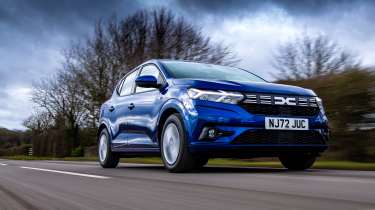
- Prices from £14,700
| Pros |
|
| Cons |
|
Dacia continues to provide great small and affordable cars for those seeking real value for money, and the latest Dacia Sandero is a great example of how far the no-frills brand has come.
Under the skin, the Sandero shares its platform with the Renault Clio, which is a great starting point. While there’s a little more road and wind noise than in the most insulated small cars, you’ll find the handling safe and secure.The Sandero has a decent ride around town and is a competent motorway cruiser, too. The turbocharged petrol motor has plenty of grunt, so you don’t have to work it too hard, and its 10.5-metre turning circle makes slotting the car into tighter spaces a doddle.
The dash design is attractive enough and the interior feels well-built, which is arguably more important than being touchy-feely, which is one area Dacia has had to make compromises. The Dacia Sandero is more spacious than cars of similar price like the Kia Picanto and Hyundai i10 in the class below, and the 328-litre boot is perfectly decent.
“The Dacia Sandero continues to offer great practicality for cost-conscious buyers. It even makes sense for those choosing the higher specification versions, because its low running costs shouldn’t leave them out of pocket.��� – Ellis Hyde, news reporter.
Dacia Sandero review Latest Dacia Sandero deals
How we tested to find the best small cars
Small cars should be affordable to buy and run, and good to drive. Increasingly we’re expecting big car levels of technology, equipment and build quality from smaller models too, and that’s a difficult circle for manufacturers to square when the price also needs to be low.
We’ve tested every small car on the UK market and always pay particular attention to that driving experience in an urban setting where light controls and good visibility are key for turning and parking. That’s not to say the best small cars shouldn’t be able to cope with longer motorway journeys though, and we always test them extensively on the open road.
No car makes this list without balancing strong fuel economy and low insurance costs, either because keeping costs down is kind-of the point for many small car buyers. Rear seat and boot space is nice to have but many buyers in this market won’t use it so we don’t let that be a deal-breaker.
Tell us which new car you’re interested in and get the very best offers from our network of over 5,500 UK dealers to compare.
Best small car deals

